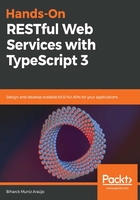
What is REST?
RESTful web services are services built according to REST principles. The idea is to have them designed to essentially work well on the web. Alright, but what is REST? Let's start from the beginning, that is, by defining REST.
The REST style is a set of software engineering practices that contains constraints that should be used in order to create web services in distributed hypermedia systems. REST is not a tool and neither is it a language; in fact, REST is agnostic of protocols, components, and languages.
It is important to say that REST is an architectural style and not a toolkit. REST provides a set of design rules in order to create stateless services that are shown as resources and, in some cases, sources of specific information such as data and functionality. The identification of each resource is performed by its unique Uniform Resource Identifier (URI). REST describes simple interfaces that transmit data over a standardized interface such as HTTP and HTTPS without any additional messaging layer, such as Simple Object Access Protocol (SOAP).
The consumer will access REST resources via a URI using HTTP methods (this will be explained in more detail later). After the request, it is expected that a representation of the requested resource is returned. The representation of any resource is, in general, a document that reflects the current or intended state of the requested resource.